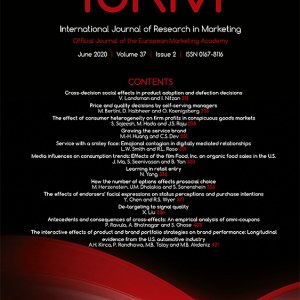
Kackovic, M., Bun, M., Weinberg, C., Ebbers, J. and Wijnberg, N. (2020). Third-party signals and sales to expert-agent buyers: Quality indicators in the contemporary visual arts market. International Journal of Research in Marketing, 37(3):587--601.
-
Affiliated authorNachoem Wijnberg
-
Publication year2020
-
JournalInternational Journal of Research in Marketing
This paper builds on a fine-grained longitudinal dataset detailing 22 years of contemporary visual art sales to corporate collectors. We focus on expert buyers who act as agents for the art collecting organizations who employ them. Our major findings show that third-party indicators of quality – reviews, awards, and gallery affiliations that have been received by visual artists over time – are positively related to sales. Moreover, this relationship persists far beyond the time when the signals were first conveyed. These results are interesting because compared to ordinary consumers, these expert buyers are assumed to make purchase decisions based on their professional knowledge of contemporary visual art that enables them to recognize quality that is only obvious to a trained “eye.” However, we show that simple indicators of quality based on third-party signals strongly influence them. Our findings provide a much-needed understanding of the mechanisms guiding expert-agent buyers' purchase decisions, particularly in markets with high uncertainty about quality and high levels of innovation. We argue that third-party signals influence these expert-agent buyers because they prefer to make purchase decisions they can readily defend.